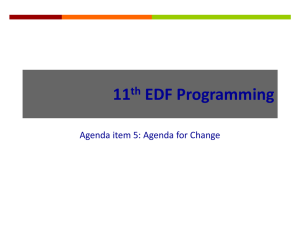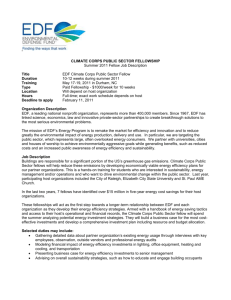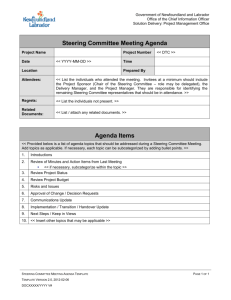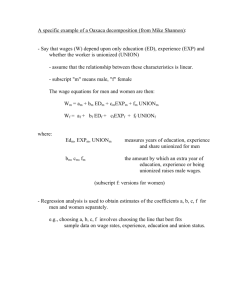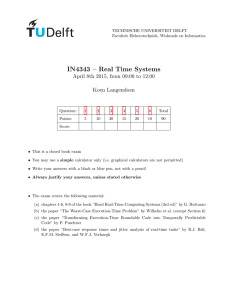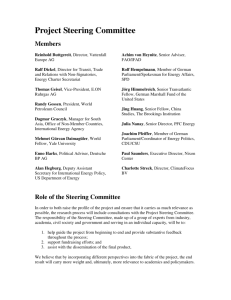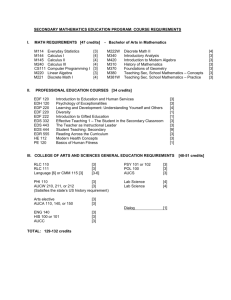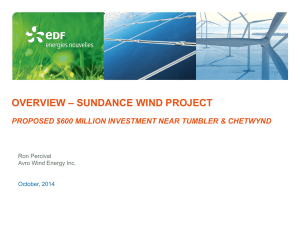3. EDF Steering Committee
advertisement
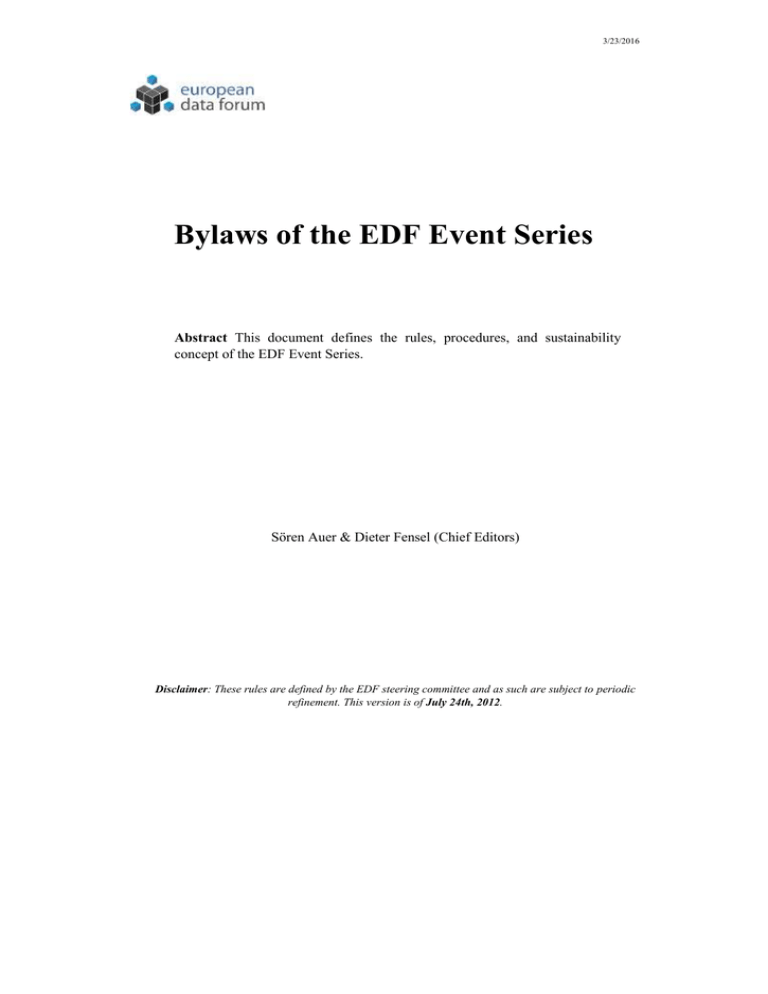
3/23/2016 Bylaws of the EDF Event Series Abstract This document defines the rules, procedures, and sustainability concept of the EDF Event Series. Sören Auer & Dieter Fensel (Chief Editors) Disclaimer: These rules are defined by the EDF steering committee and as such are subject to periodic refinement. This version is of July 24th, 2012. Contents 1 Mission ............................................................................................................................. 3 2 Structure of the conference .............................................................................................. 4 2.1 Chairs......................................................................................................................... 4 2.2 Organization Committee ........................................................................................... 5 2.3 Programme Committee members .............................................................................. 5 2.4 Invited speakers ......................................................................................................... 7 2.5 Local Host Organization............................................................................................ 7 3. EDF Steering Committee ................................................................................................ 8 3.1 Tasks of the Steering Committee............................................................................... 8 3.2 Procedures of the Steering Committee ...................................................................... 8 3.3 Members of the Steering Committee ......................................................................... 9 3.4 Decision Procedure of the Steering Committee ........................................................ 9 3.5 Chairs of the Steering Committee ............................................................................. 9 4. Operational aspects ....................................................................................................... 11 4.1 Financial Organization of the Conference ............................................................... 11 5. Liabilities ...................................................................................................................... 13 2 1 Mission The European Data Forum (EDF) series is a yearly event on social, economic, research, engineering, and scientific topics centered on the arising European data-driven economy. Currently the conference encompasses major areas such as: Big data which are large volumes of data that require new engineering and scientific approaches to meaningful deal with these volume. Public Open data supporting decision making and transparency. Linked Data as a universal data integration platform. Value generated from data, i.e., providing methods and tools that support a datadriven economy. Moreover, each event will define a specific focus and theme. These are defined in a mission report written by the event chairs and approved by the steering committee. A major focus of the event series is to raise issues that are of interest to European SMEs, however, EDF also aims to provide a meeting place where they network with colleagues from research, policy making, societal initiatives and from large industry. EDF events are envisioned to run under the umbrella of the respective EU presidency. 3 2 Structure of the conference Here we define the overall structure and elements of a single EDF event. 2.1 Chairs Each event has two Chairs to oversee all activities of a specific EDF event. They must be a senior1 person with an outstanding scientific, engineering, or entrepreneur track record and an appropriate level of organizational skills. The Chairs have overall responsibility for all matters. As such, the Chairs report directly to the Steering Committee through their co-chairs or designate on the planning, progress, operation, and final results of the event. The Chairs select/propose all other committee members of an EDF event (see more details in the following). They ensure (in cooperation with the local host) the support of the particular EDF event through the EU presidency. The Chairs submit the mission report which defines: The specific theme of the upcoming event, Precise data and location of the event, An organization committee, and A budget plan. A preliminary event report should be issued and verbally presented to the Steering Committee during its meeting at the event. In this report, the Chairs should give a synopsis of the attendance, program quality, organization, and explain significant variations with respect to the plans and expectations. A preliminary written financial report must be provided. The Chairs must submit a written final event report to the Steering Committee within three (3) months after the event has been held. It should cover the previously mentioned categories and report on all experiences and recommendations useful for organizers of future conferences. The event report is published on the EDF web site. 1 We use senior in this context as synonym for being well-respected. 4 The Chairs are selected by the Steering Committee. 2.2 Organization Committee The program of the event is prepared by the Chairs with the help of the Organization Committee. The Organization Committee should cover the various aspects (big, open, linked, public, etc.) and roles. i.e., stake holders (science, engineering, politics, societal initiatives, small business, large business, etc.), that are involved in the arising data economy. Some of its member may have a specific role such as chairing: Hackathons, Industrial exhibitions, Local Organization, Meta Data, Poster sessions, Publicity2, or Sponsorship. The Organization Committee members are proposed by the Chairs and approved by the Steering Committee. 2.3 Programme Committee members The task of PC Members (PCMs) is to assemble an attractive programme for the EDF. Other than in purely scientific events in the EDF PCMs should engage more actively in attracting diverse, high quality talk proposals and engaging side-events focused on the 2 Good practice is here to have two members, one focussed on the global and one focussed on the local dissemination aspect. 5 EDF stakeholder communities. Depending on the prospective size of the event the PCMs can overlap with the Organizational Committee members. PCMs should have a significant scientific, technological, entrepreneurial or application-/community-oriented track record in their respective areas and be willing and committed to actively outreach to potential speakers and multipliers as well as carefully and fairly evaluate the quality and potential impact of the submitted talk proposals, papers and other programme elements. PC Members (PCMs) are selected by the Chairs. The Chairs should provide information about the mission of the event (e.g., broadening, thematic focus), policies of talk proposal and paper evaluation, the scheduling of PC work (especially the dates for talk proposals and papers to be available for reviewing, timeframe for e-mail or Web-based discussion of controversial or otherwise specific talks/papers, and the PC meeting date), and other operational procedures (e.g., handling of PC submissions) to PC candidates together with the invitation for serving on the PC. PC members must agree that they will do their best to implement the EDF mission and policies. PC members must also agree that they have sufficient capacity to perform all the duties required for establishing an attractive EDF program. The Chairs should select the members of their PCMs based on personal knowledge or strong recommendations on the candidates: Technical competence on the important areas to be covered, Ability to handle submissions beyond their core areas of expertise, Performance in terms of responsiveness and thoroughness, and Ethical integrity with regard to dedicating time to the event, keeping the selection process confidential, fairness, etc. The following recommendations are made regarding the selection of PC members (not in order of priority): Select people who are not over-committed and who are capable and willing to perform a high quality selection/reviewing job on time. Try to achieve a good gender and geographical distribution. PC members are excellent channels to advertise the conference and to solicit talks, Try to balance between scientists, engineers, and entrepreneurs as well as SMEs, large companies, NGOs, public sector, etc., 6 Select people who have a good research, technology community or application record and an international recognition in areas related to EDF, and Try to involve “new faces”. One of the factors for the success of the EDF conference series is its explicit policy to always try to bring new capable persons into the community;3 2.4 Invited speakers The main track of the conference should include 2-4 keynote talks by invited speakers. There should additionally be a slot for a keynote from the head of the data value chain unit. 2.5 Local Host Organization There must be a Local Host Organization that together with the Chairs establishes the local arrangements for the conference. She is selected by the Steering Committee. 3 It is recommended to use new media channels for this search and to allow selfsolicitation. 7 3. EDF Steering Committee The EDF Steering Committee acts as board of the EDF event series. 3.1 Tasks of the Steering Committee For each conference the Steering Committee: 1. Reviews the current EDF event, 2. Reviews the areas of the EDF series, 3. Discusses strategic conclusions to be drawn for future events based on the outcomes of (1) and (2), 4. Selects the Chairs of the next event, and 5. Approves location, time, local host organization, mission, organization committee, and budget plan of the next EDF event.4 3.2 Procedures of the Steering Committee The format of the work of the Steering Committee is defined as following: A face-to-face meeting during the EDF event performing Task 1-4. Task 1-3 should provide a general point of reference for the mission and outline of the up following EDF event. In addition, a frame for the time and location of the next event should be defined. A phone conference at latest 2 months after the event with the goal to discuss, refine, and approve the mission document for the upcoming event (Task 5). 4 With the restriction that the event should be hosted yearly in the country that respecitvely holds the EU presidency. 8 A phone conference 2-3 months before the event to monitor the progress. (Task 1) and recommend actions if needed. A need for additional follow-up phone conferences may be derived from it. 3.3 Members of the Steering Committee The EDF Steering Committee consists of: The Chairs of each of the last four EDF events. Currently these are Sören Auer, Dieter Fensel, Michael Hausenblas, and Elena Simperl. The head of the data value chain unit. This is Marta Nagy-Rothengass. She also appoints an additional representative of her unit. Currently this is Francesco Barbato. Two Co-Chairs of the EDF Steering Committee who are proposed by the head of unit and approved by the majority of the steering committee.5 Further members selected by the EDF Steering Committee. Currently this is Martin Kaltenböck. 3.4 Decision Procedure of the Steering Committee Decisions are taken with majority of all votes that are not abstentions. 3.5 Chairs of the Steering Committee The Chairs of the EDF Steering Committee: Lead the agenda of the f2f meetings during the EDF event, Organize and chair phone conferences, 5 Auxiliarilly, Sören Auer and Dieter Fensel (Chairs of the first EDF event) act in this role. 9 Represent the EDF Steering Committee with regard to external requests, and Invite external experts to participate as guests in discussions of the EDF Steering Committee (without voting rights). 10 4. Operational aspects Here we specify further important details of running an EDF event. 4.1 Financial Organization of the Conference In general, the Chairs and the Local Host must agree on the financial plan and the budget management process and need to request approval for their plan by the Steering Committee. This financial plan should include: Contributions by the Local Host organization (conference location, catering, and local on-site conference organization support), Industry sponsoring, Travelling support for invited speakers, Travelling grants for participants from SMEs6, and EU project support (e.g., PlanetData, LOD2, projects from current or future calls, administrated by the data value chain unit) and conference fees (100 Euro maximum). The budget management could be centralized (either by the Chairs or Local Host Organizations) or it could be decentralized. An example for a decentralized budget management plan is provided below. Example for a decentralized budget management plan. §1 The Local Host should cover the local organization costs. This includes conference location, catering, and local on-site conference organization support. She is invited to acquire (local) sponsorship to cover these costs. The related DIRECT costs (including labor) could be between 10 and 20K€. Notice that she can also acquire one or several European projects as sponsors. §2 The organizations that provide the Chairs should cover the general event management and dissemination costs (possible in cooperation with a dissemination chair and his/her organization and an involvement of the local organizer). This may be up to 6PM and 10K€ on video, video lectures, and press clips. 6 Or SMEs in the mature process of foundation. 11 §3 The event charges a lump sum as conference fees that are used to finance the conference dinner. For successful applicants of SME travel support the conference fee could be waived. §4 EU projects and further sponsors are going to pay for: Key notes and invited speaker. 5-10K€ DIRECT costs (depends on number and traveling costs). PlanetData is offering to provide this service for 2013 and 2014. These costs are directly managed by this sponsor. Traveling grants for SME conference participants. 20 times 500€ = 10K€ direct costs should be covered by a sponsorship package. However, projects may volunteer for more packages. Using a first-in-first-out approach, applications and travel cost reimbursement should be directly managed by these projects. Regarding EDF2013, the project LOD2 and several other new initiatives can be taken into account as sponsors. It is nevertheless advisable to seek out additional and new initiatives supporting the event. §5 Members of the Organization Committees should reserve significant amounts of their time to fulfill all their tasks properly. They also should ensure proper encouragement for this from their employing institutes plus additional technical, financial, and management support of them if required. The Chairs of the EDF steering committee are willing to support this through personal communication if needed. 12 5. Liabilities Conference officials should be aware that they may become individually liable in case of violation of copyright laws, claims of plagiarism, and claims of slander, errors-andomissions, trip-and-fall accidents, selection of unsafe carriers, to name the major risks. The officials are strongly advised to minimize their risks by taking an aggressive problem-prevention policy. This includes shifting the burden to authors by requiring them to sign copyright statements and transfer agreements; to participants by signing disclaimers on registration; by employing external organizations for providing all services not directly connected to running the conference, such as hotel reservation agencies or travel agencies, have these organizations assume responsibility for all corresponding risks, and place a corresponding disclaimer in the conference announcements; by having the organization providing and running the conference venue assume the risks connected with the conference locale. The following disclaimer should be included in all conference publications: “Neither the Organizing Committee of an EDF conference nor the Steering Committee of the EDF conference series are liable for any loss or damage arising from the activities of this particular conference as exercised by its agents: conference organizers, carriers, proceedings, publications and programme committee.” Officials must make sure that liability insurance is available to them to cover the remaining risks, and in particular to persons who are authorized to issue conference funds. 13
